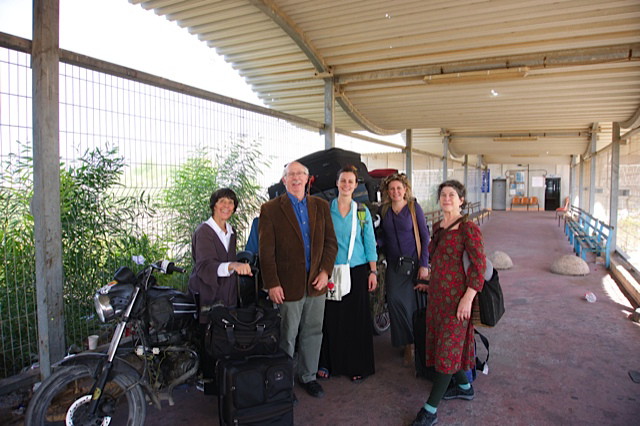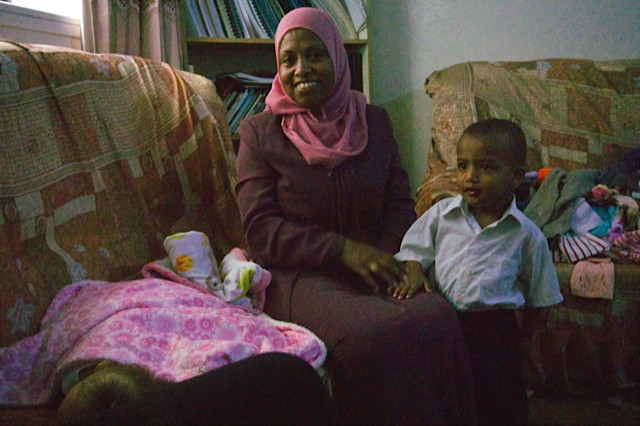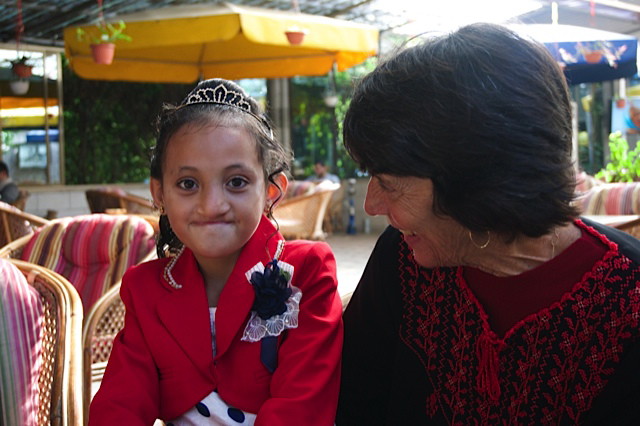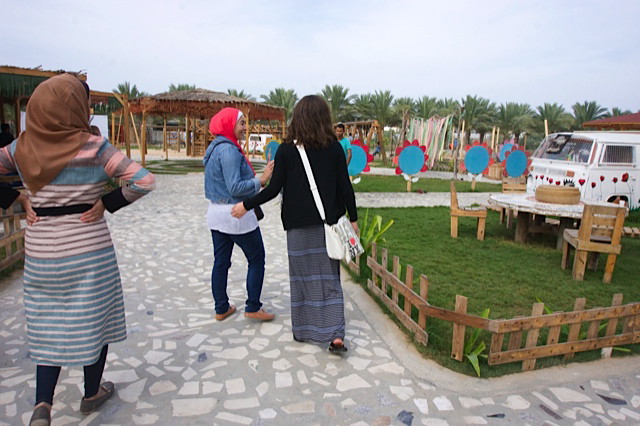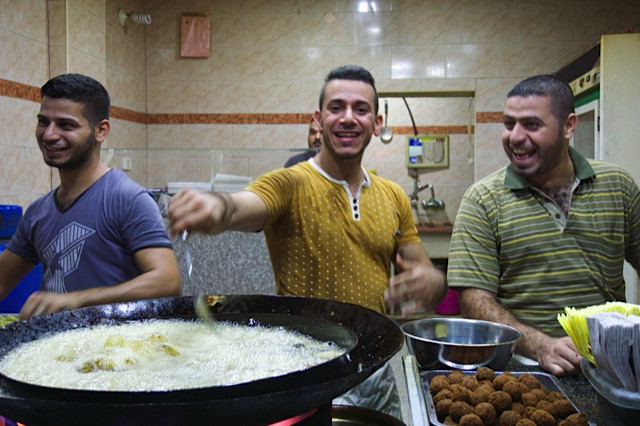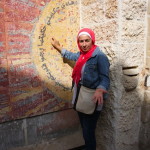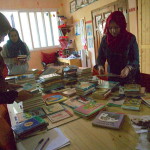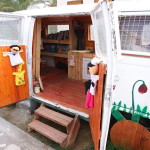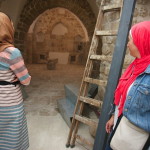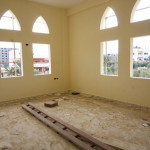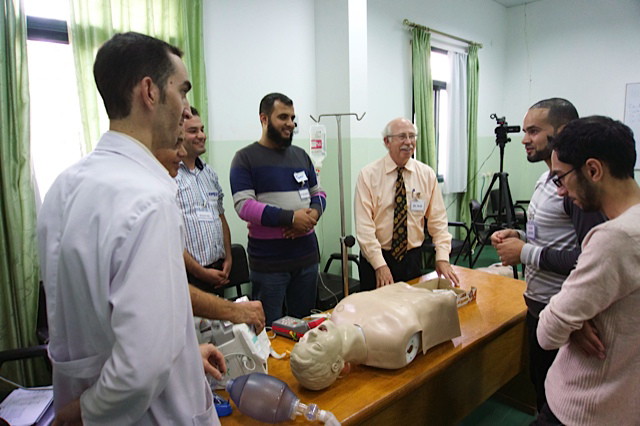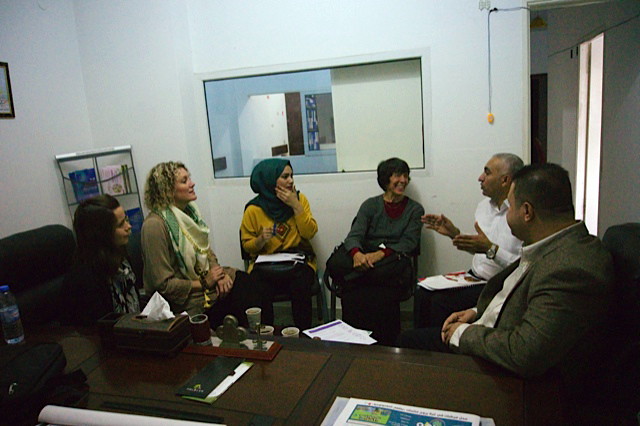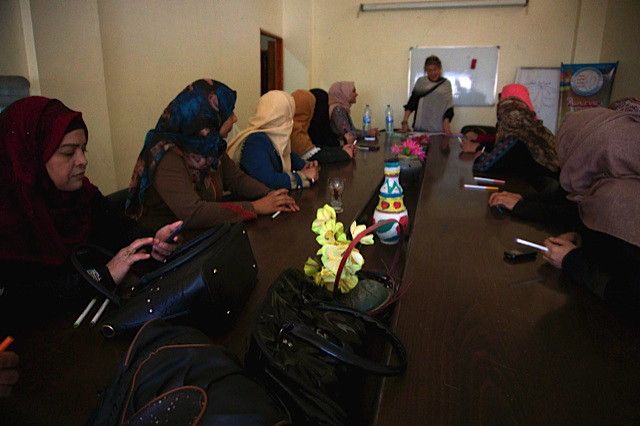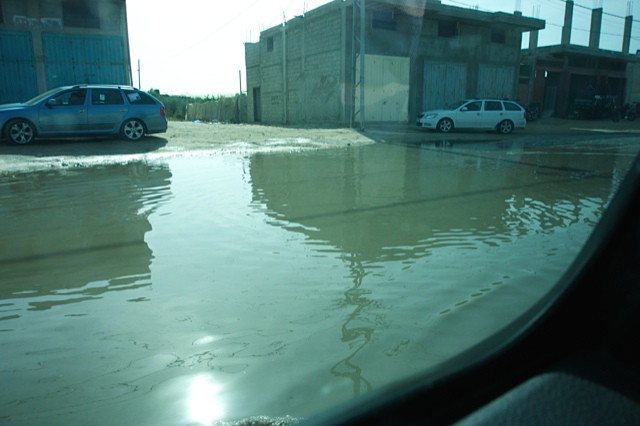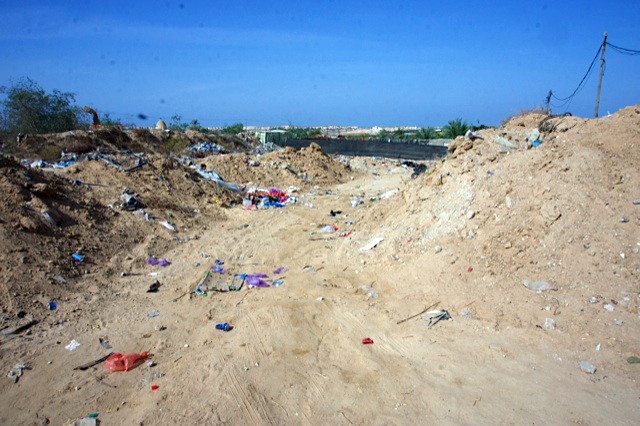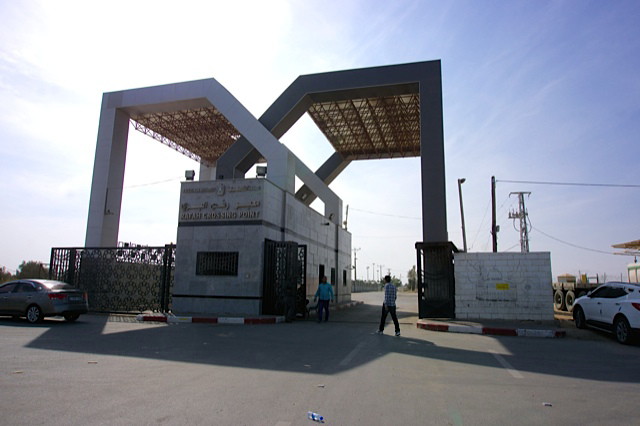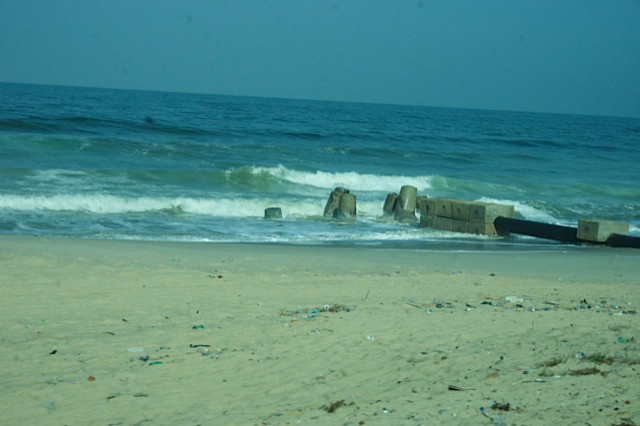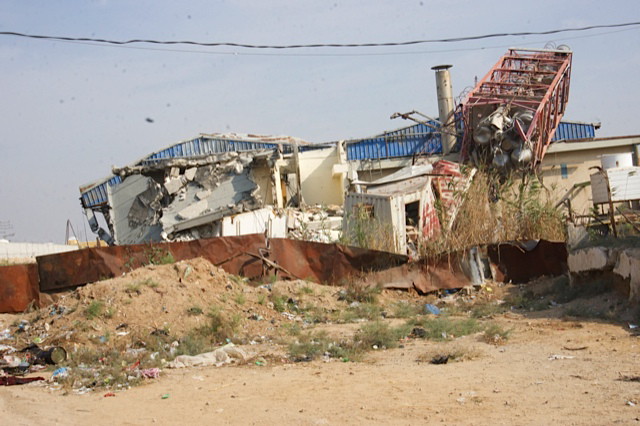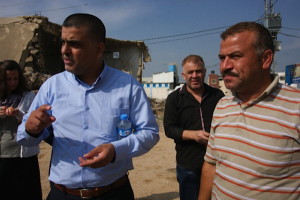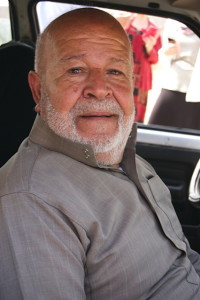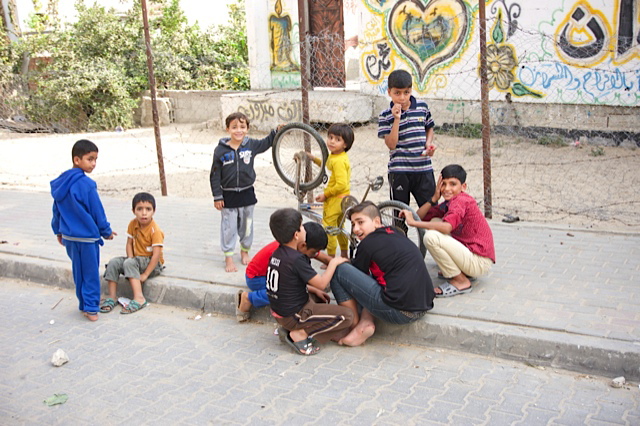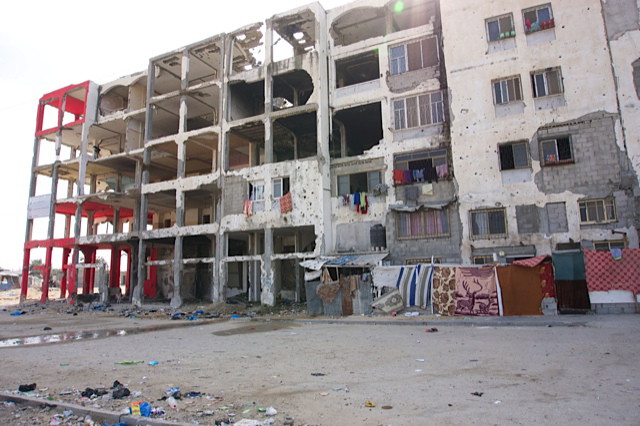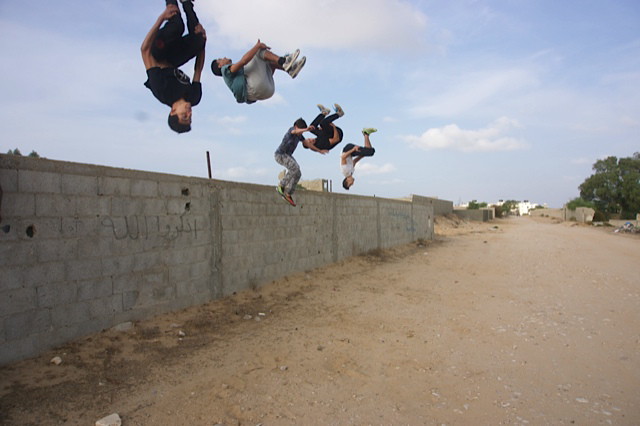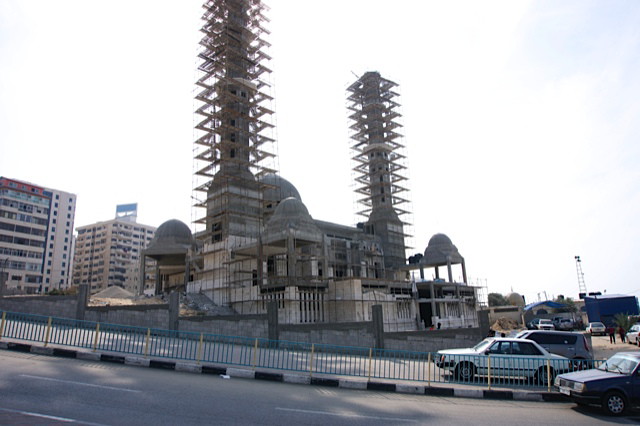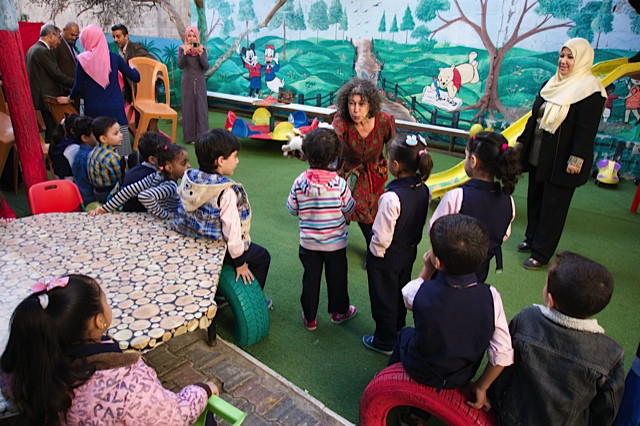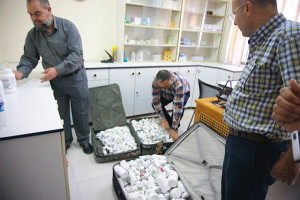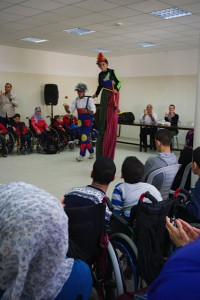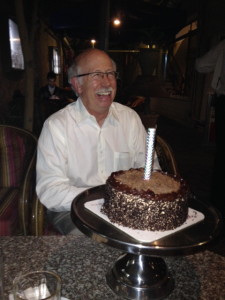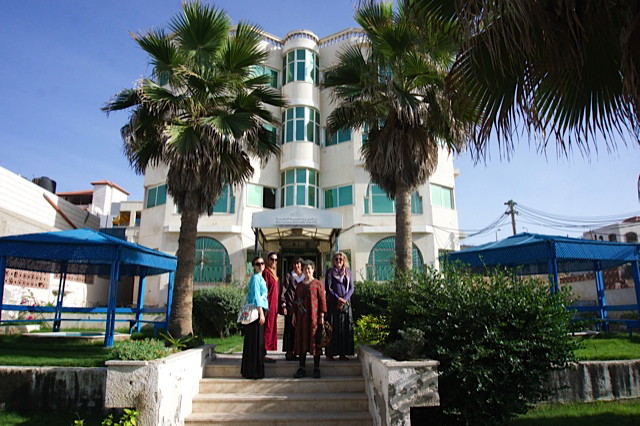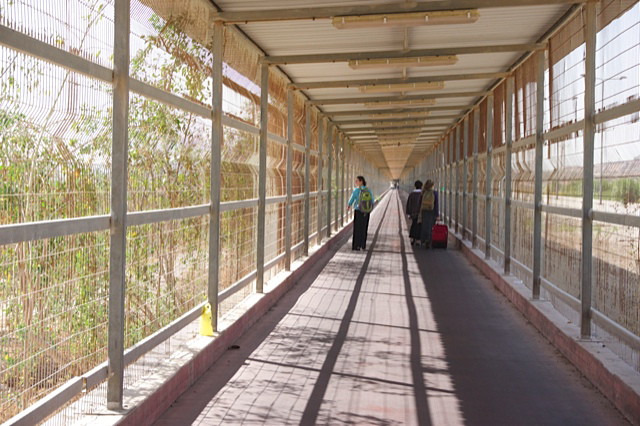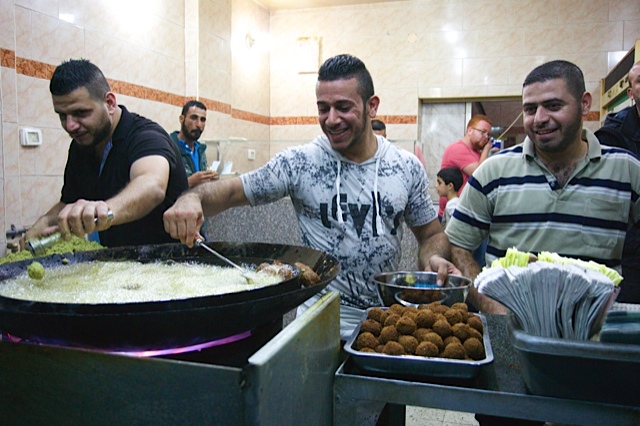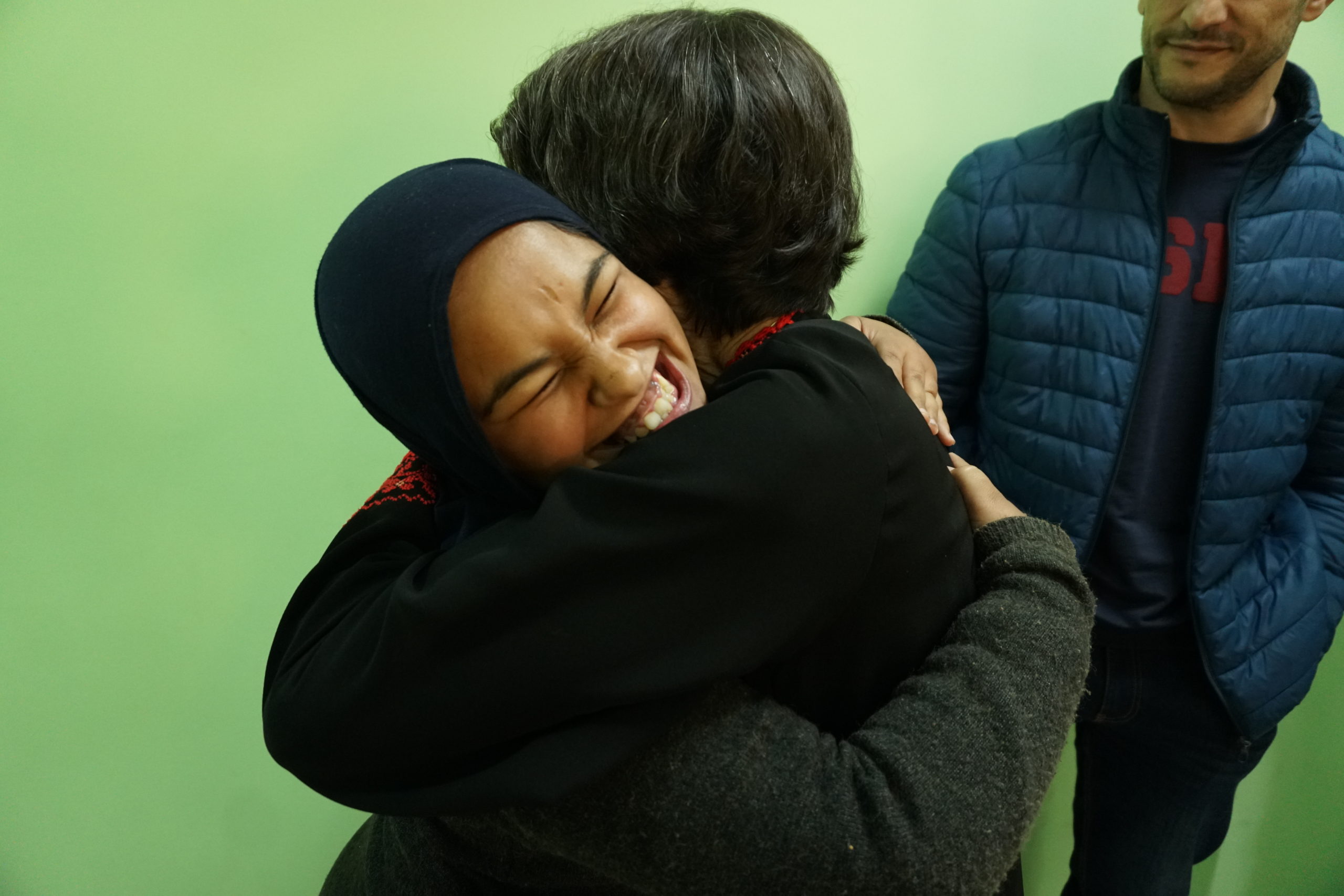
By Gerri Haynes
Concerns over the corona virus are causing chaos in airports. Our group decided that early departure from Gaza is the reasonable thing to do and now we have been told that the crossing out of Gaza will be closed all next week – so we are arranging for earlier flights home.
As we leave this place of incredibly courageous and loving people, I am struck by the level of great humor that we witnessed during this visit. In our visits to care centers and with long-time friends, I also was struck by the innate ability of the people in Gaza to find joy in laughter.
The wonderful director of Gaza’s cerebral palsy Center toured us through the reconstruction of the Center’s building – a structure that was badly damaged in 2018 by missiles that struck an adjoining building. Throughout the Center we witnessed severely affected children responding with joy to the presence of the director.
Over several years of visits, I have repeatedly met a young girl whose condition had confined her to a wheel chair and prevented her from developing speech. Nevertheless, each time I have visited her, she has greeted me with wonderful smiles and happily clapped her hands.
During this visit, I was amazed and delighted to see her walking (with assistance) toward me, reaching out so that we could hold each other. She had had surgical procedures that allowed movements of her legs and given her some freedom!
Through teaching and consultations our group discovered many more possible avenues of care that are open to visiting medical professionals and there is a will among us to return to Gaza.
The economy in Gaza is in desperate condition. Unemployment is 43 to 74%, depending on age and gender. The environment suffers extremely from lack of access to clean water (The World Health Organization has just reported that 97% of the water is not fit for human consumption) and there is virtually no freedom of movement between Gaza and the world beyond.
In the classes I taught, there were no young people who had traveled outside Gaza, this land that exists under immediate and constant threat of destruction. Still the spirit of Gaza, the generosity of Gaza, the brilliance of the people here could inspire the world to reinvest in humanity.
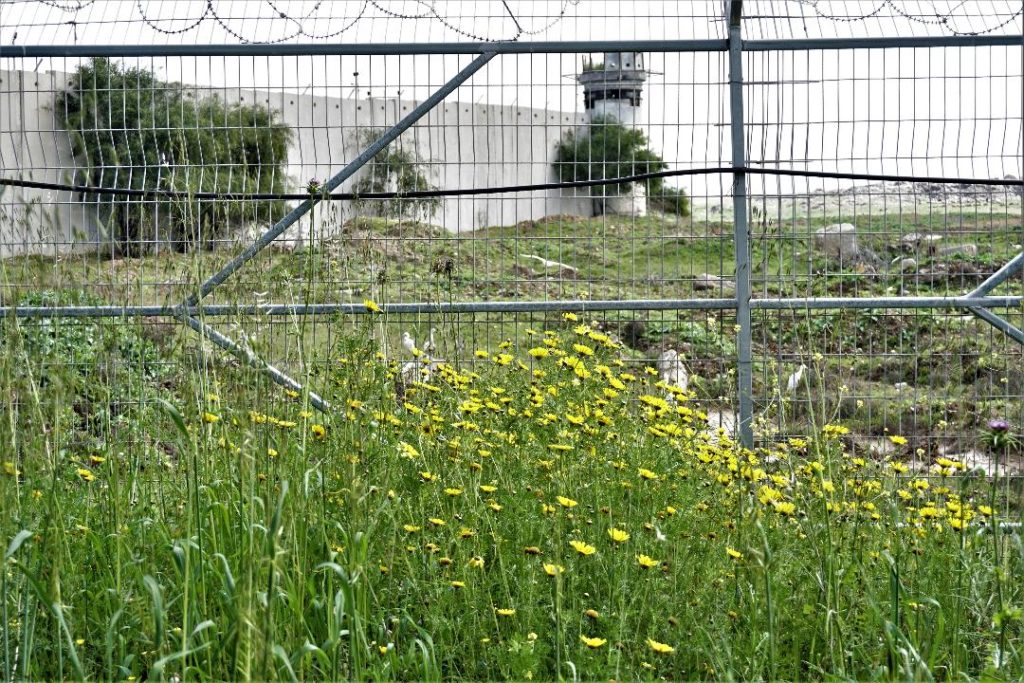
By Gerri Haynes
Hosted by The Gaza Community Mental Health Programme and sponsored by Washington Physicians for Social Responsibility, ten medical professionals have come to work in Gaza.
Over two million people live on this narrow, 25-mile long strip of land on the Mediterranean Sea, bordered by Israel and Egypt. For nearly 13 years, Gaza has been under blockade/siege by Israel – movement of people and materials is severely curtailed and this imprisonment is demonstrated in nearly every aspect of life here.
We started this visit in Bethlehem at the end of February and moved to Gaza on March 1 – in these days, we have met with amazingly warm and courageous people – from yoga students to physicians in hospitals to patients in clinics to the directors and staff of inspiring centers for care and development. The constant threat of bombing exists here and every person who lives in Gaza has stories to tell of the violence and trauma that enters their life from beyond the border.
In Khan Younis on Monday, several of us were amazed again at the work of Reem Abu Jaber, a great woman who has directed, for children, the development of a cultural center, playgrounds (with repurposed Volkswagen vans), pre-school and kindergarten programs with libraries, a science center, and remodeling of a 1400 year-old monastery into a beautiful library. Reem, in some almost magical way, refuses to be sidetracked by the traumatic environment of Gaza and these projects have a profoundly positive effect on the children and families served.
On Tuesday, the director of Atfaluna, center for care of the deaf, showed us the incredible handwork being accomplished by the people who are served by this center. We were amazed to watch a man with no hearing communicate through touch signing with a deaf and nearly blind co-worker.
I have also been teaching and consulting – working with the crisis intervention team of GCMHP on trauma and grief. These young people who serve their traumatized community have to learn to care for themselves while they are caring for individuals and families in warring attacks and in the aftermath.
In Gaza, every person has to face the reality that each day brings the possibility of a bomb or mortar striking his or her home or neighborhood. Every family with children has to consider how to talk with the children about possible attacks and to form a plan for response to an attack. Every person has experienced bombing on a frequent basis. Every person knows someone who has been injured or died as a result of gunfire or bombing.
In the classes I teach, we talk not of PTSD (Post Traumatic Stress Disorder), but of CTSI – Continuous Traumatic Stress Injury. There is no “Post” here and the constant exposure to the threat of trauma is itself traumatic. Still, the people support each other and, even though we come from the United States, they welcome us warmly.
I continue to believe that if the people of the United States could see what is happening to the wonderful people of Gaza, we would demand justice and freedom for them.
Leaving Gaza, November 15, 2016
Please understand this: the taxes you pay directly support the siege of Gaza.
Two million people live here. In this small plot of land, surrounded by Israel, Egypt and the Mediterranean Sea, the population density is one of the highest in the world.
At night, or in the dark of early morning, the ominous sound of fighter jets flying low reminds them that no one here is secure from attack. Drones fly over constantly. Gazing out over the Mediterranean, the presence of Israeli war boats emphasizes the reality that deep water fishing is prohibited – and the regular attacks on Gaza fishermen makes fishing a dangerous activity.
Gaza has virtually no clean drinking water – the over pumped water aquifer is not replenished because the water that would refresh the aquifer is diverted by Israel. Movement of people and goods is extremely limited – the rate of unemployment in people ranges from 36 – 63%.
Young people need and want to help support their families, but finding employment is rare. I met with a young man this week who has a master’s degree in social work. His father was killed in the last war – he lives with his wife, his baby, his mother and his sisters. They have NO income. The shoes he wears are separated from the soles. He fears he will not be able to find food for his baby. While the UN Relief Works Agency supplies food for the majority of people in Gaza, every employable person would prefer to be working and paying for their own food.
The coastline of Gaza is beautiful – lovely sand, warm water. It looks inviting until the appearance of raw sewage pouring into the sea reminds the viewer that the brown pools and noxious smell are occasioned by the lack of water treatment. Gaza is forbidden by Israel to install effective water treatment plants that would secure safe drainage into this sea.
Schools here are extremely overcrowded – the best of the schools double shift – some continue to triple shift. The people of Gaza are not allowed to bring in the materials needed to solve the need for adequate schools. We were told that UNRWA is building one new school each month, but to address the requirements of the population, more than 300 schools are needed.
The Gaza Community Mental Health Programme, the great agency who sponsors our visits to Gaza, is doing all it can to address the mental health needs here. Living with the pain of the last three major attacks (2008/2009, 2012, 2014) and the constant threat and actual “limited” bombing that plagues every day has created an atmosphere of Continuous Traumatic Stress Injury here. (There is no Post to this injury.)
Yesterday, we met a beautiful first grade boy who carries the trauma of the 2014 war – not able to participate in normal activities of home or school – continually frightened by the threat of more war. Staff of GCMHP will refer this boy to a pediatric psychiatrist in their group – this boy is one of so many carrying constant fear.
Every person in Gaza knows that when unexploded ordinance from wars are recovered, the canisters are emblazoned with these words: “Made in USA.” What will happen to Gaza now, as the US administration changes, is an ongoing matter of worry.
Today, our last whole day in Gaza, was full of people we love and people who came to our hotel for consultation in their care.
The leader of the cochlear implant center came to the hotel to tell us of the progress being made to help hearing-impaired children in Gaza. Gaza has a growing group of children with hearing difficulties, and this young woman has dedicated her life to getting assistance for these children.
Just over one year ago, our beloved nurse friend, Naima, named her baby Gurri (they call her Gerri). Today, we traveled to Gurri’s home to visit and hear of life in their neighborhood.
Gurri has one older sister and two older brothers – all bright and beautiful children. It was delightful to watch them eagerly open and study the books we brought to them. Again and again, we hear of growing concerns about the possibility that doors will close to Muslims wanting to visit the US when Mr. Trump becomes president.
This afternoon, Bob and I met with a series of patients who were seeking consultation – children with complex medical problems and adults whose care will need to be addressed outside Gaza.
One little girl, who has a partially repaired cleft lip and palate, shone with love as her father spoke to her and told us about her. He related that she is the top of her school class. After seeing us today, they were going to the beauty shop where a new hairdo was planned.The lack of medical coverage for the extensive care she needs is a problem. We will consult with practitioners in the US regarding possible next steps for this beautiful child.
Tomorrow, after Meghan Fitzgerald (PhD student traveling with us) gives a lecture, we will say farewell to Gaza– a time too short – taking with us so many stories and hopes for freedom.
Please see the UNRWA report: http://www.unrwa.org/newsroom/press-releases/gaza-2020-liveable-place
Day Six in Gaza
In Gaza, we find gracious, generous, helpful people – people who live in this small prison and yet find it in their spirits to be welcoming and kind. Among these wonderful people, there is a phenomenal woman, Reem Abu Jaber, who has created places of hope and learning, places that give children and communities a sense of strength and commitment to life.
Today, Reem spoke of the many projects currently underway in her area. Among at least ten projects: the growing cultural center, NAWA, a place of creative instruction for local children; a two-story kindergarten – the second story being a land of focused instruction (the first will be a minute description of the anatomy of the human body); a beautiful playground – now expanding to include a performance stage; a neighborhood garden; a photography project to instruct children in seeing with a camera; and an extraordinary remodel of a 1700 year old monastery into a magnificent library for children.
Reem’s ability to imagine and involve others to create and bring to life places and possibilities for the mental, social and physical health of children seems endless. Each time we visit, I am overwhelmed by the challenges of life in Gaza and Reem’s refusal to allow these challenges to stop her commitment to the children. She is a living standard of courage.
Also spreading joy to all who visit here and are lucky enough to love falafel – our friend, Mahmoud and the men he works with. Each evening, a crowd of people gathers to soak up the happiness that pours out during the creation of delicious falafel – great smiles and comments of humor keep people coming back again and again. They are already historic in Gaza!!- Art on the entrance to the library
- Sorting books sent from the NW
- The playground library
- The remodeled monastery
- The second story of the new kindergarten is under way
Day five in Gaza
Basmat Amal Association for Cancer Care is one of the heroic NGOs serving Gaza. Maria was invited to join a group of women at this inspiring clinic to teach them skills that will help them cope with life here.
Among many activities, the Association provides free transportation from Gaza to specialized medical care in the West Bank and Israel, provides a creative camp for children, distributes food kits to cancer patients and provides cancer awareness and prevention seminars. Funding is constantly an issue – another challenge of the ongoing siege on Gaza.
Bob Haynes wrote about his time here:My medical service in Gaza since 2009 has evolved from participating in cardiology clinics to teaching Advanced Cardiac Life Support courses.
The clinical work allowed me to have an intimate (but very brief) glimpse into the complicated course of cardiac illness and therapy in a country under siege. I remember the man with severe 3-vessel heart disease who was not allowed out of Gaza for a life-saving bypass surgery because his nephew had been jailed for throwing stones at Israeli soldiers. The Israeli authorities blocked his transport – his whole family was punished and he subsequently died.
There are many others whose lives are placed in jeopardy because they cannot obtain much needed medicines. As someone said to me yesterday, “You can find everything in Gaza except money.”
Without the ability to sell vegetables and goods to Europe and the world, Gaza’s commerce has plummeted, and many fields lie fallow and people unemployed.
Teaching ACLS courses allows me to get to know a group of highly motivated students. This vigorous interactive course of material is not readily available in Gaza.
On the second day of the course last year, a student related with pride and gratitude that after the first day of the course, she had used the skills she had learned to help save the life of a man in the ER. That night, she was confident that she knew what to do!
Today, I discussed president-elect Trump and other current affairs with a bright young man who is taking intensive German language courses. He hopes that one day, he will be able to leave this small land and be able to experience for the first time the freedom unknown here.
I am grateful to be doing this work in Gaza. The people here have such generous hearts and inquisitive minds – it is a privilege to work here.
The people of Gaza give me hope.
Day Four in Gaza
Gaza is home to Women’s Empowerment Clinics – NGOs that provide education for adult women in such areas as breastfeeding, childcare, political involvement, and exercise. Funding for these clinics is a constant problem in this land of extreme unemployment.
With borders closed, movement of produce and goods from Gaza remains stagnant. A furniture industry that was once a source of international trade is nearly non-existent. Shipment of fruits and flowers is largely prohibited. Jobs in construction are not numerous enough to make a dent in the need for income in hundreds of thousands of homes.
Today we saw an increase in fishing along the coast, but the narrow corridor allowed by Israel to fishermen constricts the major fishing industry. Gaza lives in economic crisis. We visited the border area between Gaza and Rafah – an area where thousands of tunnels once provided access to goods from Egypt. People, cars, gasoline and many supplies moved through these tunnels while the 10-year-old siege prevented free transit.In the last year, nearly all of the tunnels have been destroyed. On the Egyptian side of the border, a broad swath of land has been cleared, denying the protection to tunnels that was once provided by a community of homes and other structures. The siege has been tightened.
There are rumors that the crossing (for people, not goods) at Rafah will open on a more consistent basis. For now, the crossing opens at rare intervals, generally for limited humanitarian movement or for individuals who are able to pay the high fees for access to visas.Today, the crossing was vacant and soldiers there questioned us about the US presidential election – they spoke with alarm about what may happen to Palestinians during the coming administration.
This evening, we met with Dr. Yousef Musa from UNWRA. We spoke of many aspects of health in Gaza. Primarily, the critical need is for the siege to end – to give people hope for employment, improved health, increased education and family security.Yousef organizes the ongoing UNRWA activity week for children each year – a time that gives participating children a sense of belonging and strength. Gaza is surely graced by this wise man.
Day Three in Gaza
Friday is a holy day and during this day, we were treated to time with Akram, a brilliant journalist and translator, who guided us through some of the areas destroyed in the 2014 attacks on Gaza.
Reconstruction is apparent in most of the areas that were focused on for war’s destruction, but some buildings such as a juice factory remain unrepaired. This factory is near the border with Israel and the possibility of another destructive attack makes reconstruction less hopeful. With building materials limited, much of the reconstruction is in areas further from the border.
A family of orange farmers whose groves were destroyed in 2014 noticed that we were touring their area and drove to greet us. Trees have been replanted and we were given samples of their delicious fruit.
Akram related that Israeli soldiers calculated that explosive devices were less likely to be planted in homes or in orchards than along established roads, so when the 2014 invasion occurred, tanks rolled through homes and crop areas rather than on roads. The kindly father of this group of farmers remained in his car during our visit – he is partially paralyzed from a stroke suffered after the war.Our tour of Gaza included a view of Wadi Gaza, previous site of flowing water. Dams on the Israeli side of the border with Gaza now prevent the flow of fresh water and the Wadi is the site of slow moving sewage.
We visited a fish hatchery – a hopeful site for the re-stocking of the sea along the Gaza coast. Since access to the sea border is limited, Gaza fishermen are permitted to fish only in the shallow coastal waters and re-stocking is essential.
We visited the garden of the wonderful director of Palestinian Early Childhood Education Programmes. Dr. Fatma oversees the provision of kindergarten education in much of Gaza.
The United Nations Relief and Works Agency (UNRWA) is responsible for the majority of elementary and secondary schools here, but financial and organizational support for early education is being provided by this Gaza NGO. With the exponential rise in the refugee population through the Middle East, the budget of UNRWA is critically strained.
At the end of our tour, a group of young men treated us to a demonstration of Parkour – an athletic art developed in France and played throughout the world. Free running, jumping, climbing, and vaulting enable the players to move without assistance.
In Gaza, this activity provides a sense of freedom seldom felt here. Please see: www.youtube.com/watch?v=oq-knWWK1_g
- A community repair of a bike
- Living in semi-inhabitable places
- Parkour in Gaza
- Reconstruction of mosques
(Washington Physicians for Social Responsibility has traveled to Gaza since 1993. Since 2009, following the Cast Lead invasion by Israel, WPSR has sponsored 12 medical delegations to serve the people of Gaza.)
D’vorah Kost, member of our delegation, spread laughter this morning as she magically entertained the children of a Gaza kindergarten. The children were delighted with her marionettes and her stories.
Hope is a critical component of mental health in this imprisoned land. In each visit to Gaza, we are impressed by the creative ways that schools and treatment facilities work to create a sense of hope in the children who live here.
We are told that families are struggling to maintain resilience – so many children have been orphaned in war and so many families are without employment – making reliable family life more and more difficult. Teachers and mental health professionals are working to find what will support the new generation in maintaining the ability to cope. D’vorah demonstrated this morning the importance of laughter in building resilience.
Our delegations always seek donations to provide medicines for the Gaza Community Mental Health Programme and we were able to deliver medicines to the clinic this morning. GCMHP serves the population of Gaza through clinic work, telephone consultation and community outreach. The service of this organization is critical to Gaza! Today, also, we were able to participate in the activities of Palestinian Avenir, the center for treatment of cerebral palsy in Gaza City. The director of this center embodies an inspirational spirit – bringing joy to the children who are served here and constantly finding unique and loving ways to care for these children.The Center will soon be expanded to serve children with hemophilia and thalassemia. Additionally, in this land of extremely limited electricity, a donation from the Czech
Republic is making it possible for the Center to install solar panels that will provide electricity for the six-story facility!To end this day, the wonderful staff of Gaza Community Mental Health, presented Bob with a chocolate cake and a beautiful rendition of “Happy Birthday!”
— Gerri Haynes
(Washington Physicians for Social Responsibility has traveled to Gaza since 1993. Since 2009, following the Cast Lead invasion by Israel, WPSR has sponsored 12 medical delegations to serve the people of Gaza.)
Gaza, November 9, 2016
Three months after applying to re-enter Gaza, our Washington Physicians for Social Responsibility medical group is back in Gaza (our 12th medical service delegation since 2009). The application process was arduous and, because we didn’t receive permission to enter until we had flown to Israel, the majority of our original group elected to remain in the U.S.
The young soldiers at the checkpoint did their best to assist us in gaining entry permission and several came to greet us this morning as we started the journey across the border.
Now here we are – greeting old friends, having initial program meetings and rejoicing over the opportunity to work in Gaza once more.While at the crossing we learned that the U.S. has a new president (elect). In nearly every encounter today, we were questioned about how we view Donald Trump and what his presidency will mean for the world.
Everyone seems shocked and deeply concerned – one soldier suggested that we might be happier if we elected to stay in Gaza! Over and over, we heard a prayer for the safety of the world.
Entering Gaza, we saw evidence of construction and cleaning – streets being cleaned and garbage being collected.
Today is Bob’s birthday – all of this environmental ordering gave him cheer!
We will work in women empowerment clinics, teach advance life support, learn, and report to you.
Gaza remains imprisoned by the closed borders with Israel and Egypt (including the sea border), the water remains undrinkable, unemployment grows, electricity is minimally available (0- 5 hours/day), hope is hard to maintain – yet the people are courageous and creative – and we are grateful to be here again.
— Gerri Haynes
